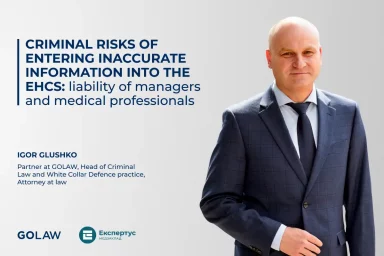Mediation in Ukraine – to be or not to be?
Contents
The quick and correct resolution of disputes on the principles of justice is always a challenge for society in general and judges and lawyers in particular. Speed, correctness, and fairness are mutually exclusive to a certain degree. It is particularly true for the traditional dispute resolution method, i.e. judicial proceedings administered by the State, and therefore criticized for its cumbersomeness and bureaucracy. That is why alternative dispute resolution methods, including mediation, have become considerably popular in world practice.
Long discussions and initiatives finally resulted in the adoption of the Law “On Mediation” (hereinafter the “Law”) by the Verkhovna Rada (Ukrainian Parliament) on November 16, 2021, which is pending to be signed by the President.
Concept and scope of the application of mediation
The Law defines mediation as an extrajudicial, voluntary, confidential, structured procedure within which the parties seek to prevent or resolve a conflict through negotiation with the assistance of a mediator.
It should be noted that the legislator extended the Law not only to private law disputes (civil, labor, family, commercial, etc.) but also to administrative disputes, cases of administrative offenses, and even to criminal proceedings (at the pre-trial investigation stage).
At the same time, mediation is allowed both before applying to the court (arbitration tribunal, international commercial arbitration) and at any stage of adjudication of a case or enforcement of the judgment (award).
To ensure the possibility of resolving a dispute through mediation, the Law provides for consistent amendments to a number of legislative acts, including procedural codes, the Labor Code, the Land Code, etc. If the dispute has been amicably resolved through mediation during the court proceedings, the Law provides for the refund of 60% of the court fee paid.
Principles of mediation
The practical experience of the use of mediation in different countries of the world shows its characteristic features enshrined in the Law as the principles of mediation:
- mutual participation of both parties to the dispute – mediation is impossible without the will of all parties to the dispute and cannot prejudice the rights and obligations of any third parties;
- voluntary participation of the parties – mediation is voluntary, and either party may terminate it at any time and refer the dispute to the court;
- support of a professional and impartial intermediary (mediator) – settlement of the dispute by the parties through negotiations without intermediation is not considered to be mediation;
- independent agreement of the parties as to the settlement of the conflict – the mediator does not make any decisions on the merits of the dispute or give the parties any instructions or recommendations (except advice on the mediation process itself), and may not combine its role with representing the parties to the dispute, including the court adjudication;
- confidentiality and non-publicity – principles of publicity of judicial adjudication do not apply to mediation, and the mediator may not be interrogated as a witness regarding the information he/she has become aware of during the preparation for and conduct of mediation;
- no detailed regulations and flexibility of the procedure – mediation is a structured process, but it is not characterized by any strict “rules of the game” similar to procedural law.
Procedure for engaging a mediator and requirements to a mediator
The parties select a mediator themselves based on an agreement (requirements for the content of which are provided for by the Law) and determine the list of issues to be discussed, and then determine the content of the dispute settlement agreement, which also must be in line with the Law.
The Law requires the mediator to undergo basic training either in Ukraine or abroad (at least 90 hours of training, of which half must be practical training) to be confirmed by an appropriate certificate. The parties may impose higher requirements to such mediator, in particular, special training, certain age, education, experience, etc. The legislator allows that other persons may give advice and recommendations in the mediation process, but making a decision based on its results is the sole authorization of the parties. The parties may also engage experts and translators.
A mediator may practice as a person engaged in the independent professional activity or as an entrepreneur — he/she may provide services individually, for hire, as a member of a mediation entity, or an association of mediators. The Law allows the provision of mediation services both for a fee and free of charge.
In addition to the basic responsibilities of a mediator provided for by the Law, the legislator requires the latter to comply with the code of professional ethics, which, however, is not a single document for all Ukrainian mediators, but must be developed by each association of mediators according to the Law. Each mediator accedes to the existing code and will be liable for its violation under the charter or regulations of the association of which he/she is a member.
The issue of keeping registers of mediators is regulated in a similar way – public registers should be kept by associations of mediators or mediation entities, however, no single national register is required.
Stages of mediation
The structured nature of mediation referred to in its legislative definition implies a simple division of the mediation procedure into three stages:
- preparation, which implies preparatory activities carried out by the mediator to clarify whether mediation may be held (the range of which is not limited);
- mediation itself, which is conducted in accordance with the Law and the agreement, rules of mediation, and mediator professional ethics; at the same time, the Law does not regulate or specify the procedure for mediation in any way;
- termination of mediation, i.e. execution of an agreement by the parties in the event of successful completion of mediation, or in connection with the expiration of the contractual period of mediation, or refusal of the party to further participate in mediation.
Conclusion
Undoubtedly, the adoption of the Law was aimed at reducing the workload of the national judicial system, as it is clear that most disputes pending before the court may be potentially resolved amicably out of court. Mediation is assumed to be the mechanism that will contribute to such effective resolution of disputes due to the professional assistance of a mediator and maximum deregulation of the process.
Instead, mediation should not be considered as a full-fledged alternative to court proceedings, as it does not imply any state coercion by its nature, and therefore is useless in the absence of the will of both parties to resolve a conflict through negotiations. It is equally important that the commencement of the mediation process does not affect the limitation period.
The dispute resolution procedure with the participation of a judge similar to the mediation procedure has been applied in Ukraine since 2017, which has produced no significant impact on the effectiveness of the dispute resolution. Moreover, mediation existed in Ukraine even before the adoption of the Law, and the Law has not made any fundamental changes in the current situation.
Therefore, it is difficult to expect any significant percentage of disputes to be resolved under the mediation procedure rather than in court after the entry of the Law into force. However, the practice of mediation is expected to be activated and take its place among alternative dispute resolution methods.
Sign up to be aware
New achievements are inspired by information. GO further, don’t miss out GOLAW news and legal alerts
Our expertise
-
- Energy and Natural Resources
- Antitrust and Competition
- Banking and Finance
- Compliance, Corporate Governance and Risk Management
- Corporate and M&A
- Criminal and White Collar Defence
- Defense in Anti-corruption procedures and regulations
- Digital Economy Practice
- Labor and Employment
- Natural Resources and Environment
- Government Relations (GR)
- Insolvency and Corporate Recovery
- Intellectual property
- International trade
- Legal support of business and private Сlients in Germany
- Litigation and dispute resolution
- Private clients
- Real Estate and Construction
- Restructuring, Claims and Recoveries
- Martial Law
- Tax and Customs
-
- Agribusiness
- Aviation
- Chemical industry
- Engineering, Construction and Building Materials
- Environment and Natural Resources
- Financial institutions
- IT and AI
- Industry and manufacturing
- Healthcare industries, Life sciences and Pharmaceuticals
- Media, Entertainment, Sports and Gambling
- Retail, FMCG and E-Commerce
- Transport and Logistics
We use cookies to improve performance of our website and your user experience.
Cookies policy
Cookies settings







